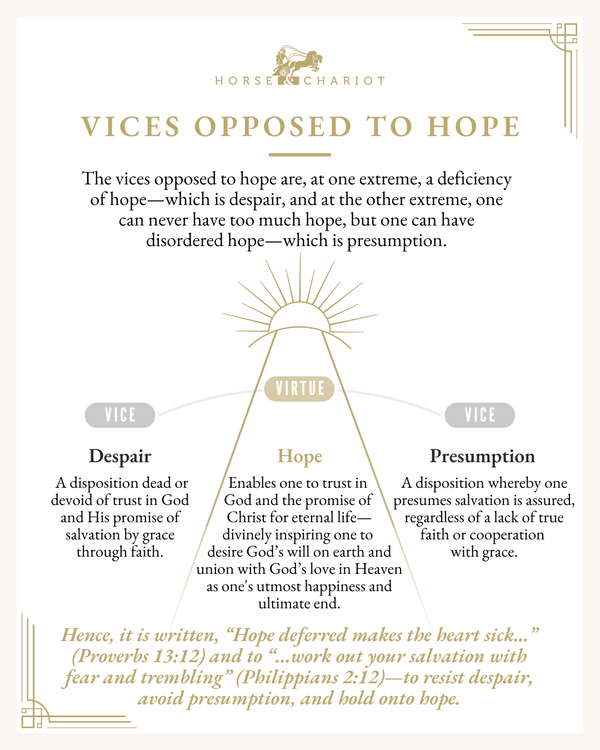All Series > Virtue of Hope > Part 3
Vices Opposed to Hope
Teaching of Virtue
Watch: On YouTube
Vices Opposed to Hope
The vices opposed to hope are, at one extreme, a deficiency of hope—which is despair, and at the other extreme, one can never have too much hope, but one can have disordered hope—which is presumption.
The vice of despair is a disposition dead or devoid of trust in God and His promise of salvation by grace through faith.
Despair is to say, “My sad state outweighs God’s mercy.” Despair is a liar. No sin or circumstance, no matter the degree, can exceed the immense scope of God’s forgiveness and grace.
The vice of presumption is a disposition whereby one presumes salvation is assured, regardless of a lack of true faith or cooperation with grace.
The presumptuous one either takes God’s grace for granted, assuming salvation despite a lukewarm and fruitless faith, expecting pardon without repentance, or they disregard God’s grace entirely, assuming salvation by their own merit, adopting the mindset, “I’m a good person, so I’m going to Heaven.”
Whether it be by despair or presumption, the belief one has already lost or already won, prevents them from running a good race. The outcome is the same—spiritual sloth.
Spiritual sloth dismisses grace and drains hope, inviting soul-dragging sins such as lust, gluttony, and aimlessness.
Hence, it is written, “Hope deferred makes the heart sick…” (Proverbs 13:12) and to “...work out your salvation with fear and trembling” (Philippians 2:12)—to resist despair, avoid presumption, and hold onto hope.

Scroll down for the related scriptures, quotes, and lesson plan associated with this teaching.
Copyright © 2024 Horse & Chariot LLC. All rights reserved.
Visual Resource

Related Scripture
“Hope deferred makes the heart sick, but a desire fulfilled is a tree of life.” — Proverbs 13:12 (NRSVCE)
“Therefore, my beloved, just as you have always obeyed me, not only in my presence, but much more now in my absence, work out your own salvation with fear and trembling” — Philippians 2:12 (NRSVCE)
“If you sow to your own flesh, you will reap corruption from the flesh, but if you sow to the Spirit, you will reap eternal life from the Spirit.” — Galatians 6:8 (NRSVCE)
“Happy are those whose hearts do not condemn them, and who have not given up their hope.” — Sirach 14:2 (NRSVCE)
“So that through two unchangeable things, in which it is impossible that God would prove false, we who have taken refuge might be strongly encouraged to seize the hope set before us.” — Hebrews 6:18 (NRSVCE)
“When the righteous cry for help, the Lord hears, and rescues them from all their troubles. The Lord is near to the brokenhearted, and saves the crushed in spirit. Many are the afflictions of the righteous, but the Lord rescues them from them all. He keeps all their bones; not one of them will be broken.” — Psalm 34:17-20 (NRSVCE)
“We are afflicted in every way, but not crushed; perplexed, but not driven to despair; persecuted, but not forsaken; struck down, but not destroyed” — 2 Corinthians 4:8-9 (NRSVCE)
“Casting all your anxieties on him, because he cares for you.” — 1 Peter 5:7 (NRSVCE)
“Do not worry about anything, but in everything by prayer and supplication with thanksgiving let your requests be made known to God. And the peace of God, which surpasses all understanding, will guard your hearts and your minds in Christ Jesus.” — Philippians 4:6-7 (NRSVCE)
“He will wipe every tear from their eyes. Death will be no more; mourning and crying and pain will be no more, for the first things have passed away.” — Revelation 21:4 (NRSVCE)
“But he said to me, ‘My grace is sufficient for you, for power is made perfect in weakness.’ So, I will boast all the more gladly of my weaknesses, so that the power of Christ may dwell in me.” — 2 Corinthians 12:9 (NRSVCE)
“He heals the brokenhearted and binds up their wounds.” — Psalm 147:3 (NRSVCE)
“Happy is the one who is never without fear, but one who is hard-hearted will fall into calamity.” — Proverbs 28:14 (NRSVCE)
“Since we have these promises, beloved, let us cleanse ourselves from every defilement of body and of spirit, making holiness perfect in the fear of God.” — 2 Corinthians 7:1 (NRSVCE)
“His mercy is for those who fear him from generation to generation.” — Luke 1:50 (NRSVCE)
“The fear of the Lord is the beginning of knowledge; fools despise wisdom and instruction.” — Proverbs 1:7 (NRSVCE)
“If only they had such a mind as this, to fear me and to keep all my commandments always, so that it might go well with them and with their children forever!” — Deuteronomy 5:29 (NRSVCE)
“The Lord is not slow about his promise, as some think of slowness, but is patient with you, not wanting any to perish, but all to come to repentance.” — 2 Peter 3:9 (NRSVCE)
“Who among you fears the Lord and obeys the voice of his servant, who walks in darkness and has no light, yet trusts in the name of the Lord and relies upon his God?” — Isaiah 50:10 (NRSVCE)
“O fear the Lord, you his holy ones, for those who fear him have no want.” — Psalm 34:9 (NRSVCE)
“The fear of the Lord is life indeed; filled with it one rests secure and suffers no harm.” — Proverbs 19:23 (NRSVCE)
“Serve the Lord with fear, with trembling” — Psalm 2:11 (NRSVCE)
“Be careful then how you live, not as unwise people but as wise, making the most of the time, because the days are evil. So do not be foolish, but understand what the will of the Lord is. Do not get drunk with wine, for that is debauchery; but be filled with the Spirit, as you sing psalms and hymns and spiritual songs among yourselves, singing and making melody to the Lord in your hearts, giving thanks to God the Father at all times and for everything in the name of our Lord Jesus Christ.” — Ephesians 5:15-20 (NRSVCE)
Related Quotes
“Doubting is the biggest insult to Divinity” — St. Padre Pio
“The fact that a man deems an arduous good impossible to obtain, either by himself or by another, is due to his being over downcast, because when this state of mind dominates his affections, it seems to him that he will never be able to rise to any good. And since sloth is a sadness that casts down the spirit, in this way despair is born of sloth. Now this is the proper object of hope---that the thing is possible, because the good and the arduous regard other passions also. Hence despair is born of sloth in a more special way.” — St. Thomas Aquinas
“When people say, ‘I know God forgives me, but I can't forgive myself,’ they mean that they have failed an idol, whose approval is more important than God's.” — Timothy Keller
“Christ was despised on earth by men, and in his greatest need, amid insults, was abandoned by those who knew him and by friends; and you dare to complain of anyone? Christ had his adversaries and slanderers; and you wish to have everyone as friends and benefactors? Whence will your patience win its crown if it has encountered nothing of adversity?” — Thomas à Kempis
“Presumption on God's mercy implies both conversion to a mutable good, in so far as it arises from an inordinate desire of one's own good, and aversion from the immutable good, in as much as it ascribes to the Divine power that which is unbecoming to it, for thus man turns away from God's power.” — St. Thomas Aquinas
“Now presumption is an appetitive movement, since it denotes an inordinate hope. Moreover it is conformed to a false intellect, just as despair is: for just as it is false that God does not pardon the repentant, or that He does not turn sinners to repentance, so is it false that He grants forgiveness to those who persevere in their sins, and that He gives glory to those who cease from good works: and it is to this estimate that the movement of presumption is conformed. Consequently presumption is a sin.” — St. Thomas Aquinas
“The other presumption is an inordinate trust in the Divine mercy or power, consisting in the hope of obtaining glory without merits, or pardon without repentance. Such like presumption seems to arise directly from pride, as though man thought so much of himself as to esteem that God would not punish him or exclude him from glory, however much he might be a sinner.” — St. Thomas Aquinas
“The vague and tenuous hope that God is too kind to punish the ungodly has become a deadly opiate for the consciences of millions.” — A.W. Tozer
“Do not look forward to the changes and chances of this life in fear; rather look to them with full hope that, as they arise, God, whose you are, will deliver you out of them. He is your keeper. He has kept you hitherto. Do you but hold fast to his dear hand, and he will lead you safely through all things; and, when you cannot stand, he will bear you in his arms.” — St. Francis de Sales

Lesson Plan
For your family, small group, or personal reflection.
STEP 1: Introduction
Example: "I'm going to play a short video on the topic of the vices opposed to hope. After the video, I have some questions to gather your thoughts and get the discussion started. We’ll then wrap up with a closing prayer."
STEP 2: Watch Video (or listen)
Watch (or listen to) the video of the teaching (cast to your TV via YouTube). If time allows, also read the teaching, related Scriptures, and related quotes.
STEP 3: Discussion / Reflection
- When have you felt that your sins or struggles outweighed God’s mercy? How can you remind yourself of the truth that no sin is greater than God’s grace?
- Have there been times when you’ve taken God’s grace for granted or assumed you didn’t need to change? What signs of a "lukewarm" faith do you see in your own spiritual life?
- How has spiritual sloth, whether through despair or presumption, affected your walk with God? What signs of “soul-dragging” sins do you notice in your own life?
- What does it mean to you to “work out your salvation with fear and trembling” (Philippians 2:12)? How can you approach your spiritual life with both confidence in God’s grace and a healthy reverence for His holiness?
- Proverbs 13:12 says, “Hope deferred makes the heart sick.” How do you guard your heart against despair when your hopes seem delayed or unfulfilled?
- Did any of the related Scriptures or quotes stand out to you (please elaborate)?
- Any other thoughts you’d like to share?
STEP 4: Wrap Up & Closing Prayer
Summarize and wrap up the discussion. Then, conclude with a sincere and humble prayer from the heart.

Join one of our free online training events.
Shop all our teachings of virtue prints.
Explore other virtue-based products.
Never miss a teaching — get all new teachings of virtue sent to your inbox free!



